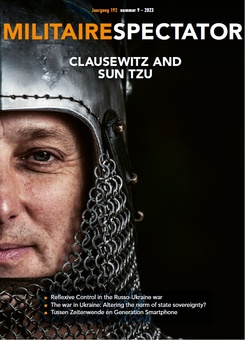Norms play an important role in international relations. Norms shape behaviour and provide a shared understanding of what is acceptable and what is not. One of the pillars of international relations is sovereignty. The norm of state sovereignty encompasses the norm of territorial integrity. Large-scale interstate wars have been exceptional since the end of the Second World War because of the significance placed on state sovereignty and its contribution to the stability of the international system. By invading and even incorporating parts of Ukraine, Russia severely violated Ukraine’s sovereignty. This article examines the grounds on which Russian President Vladimir Putin justifies the violation of Ukraine’s sovereignty. By looking into the mechanisms on how the significance of norms can decrease, an assessment is made on how the war in Ukraine could weaken the norm of state sovereignty. Giving in to Russian demands would broaden the grounds on which state sovereignty can be infringed upon. A weakened norm of state sovereignty could lower the threshold for future infringements of the territorial integrity in other parts of the world as well.
‘How long can this tragedy continue? How much longer can we endure it? Russia has done everything to preserve Ukraine’s territorial integrity.’[1][1] Vladimir Putin, 21 February 2022
Large scale state-to-state war had been absent on the European continent since the end of the Second World War. Territorial conquest of bordering states became exceptional and international disputes were mostly settled by peaceful means.[2] Despite warnings from some intelligence services, many decision-makers dismissed the build-up of Russian troops along the Ukrainian border as merely a way to increase pressure. But in February 2022, Russian President Vladimir Putin did the unexpected and authorized a ‘special military operation’ against Ukraine. In September 2022, the Kremlin even incorporated several Ukrainian oblasts into the Russian Federation. Ghosts from the past seemed to be back. States such as Moldova, Poland, and Estonia feared that after Ukraine, they could be next. On the other side of the globe, awareness of the uncomfortable parallels between Ukraine and Taiwan grew.[3]
Following the Second World War, state sovereignty became a widely accepted norm, which entailed that the territorial integrity of other states needed to be respected.[4] But the relative importance of norms may change over time. The decade after the end of the Cold War saw the emergence of international stability as a norm that could be used to set aside aspects of a state’s sovereignty.[5] By claiming that historical errors and illegitimate governments can justify large-scale violations of state sovereignty, Putin attempts to broaden the justifications for infringing state sovereignty even further. Putin even argues that the forceful redrawing of borders should be permissible if this is done in light of the right of self-determination and to rectify historical errors.[6] In February 2022, Putin put his words into action and initiated Russia’s ‘special military operation’ in Ukraine. Just as the increased importance given to the stability of the international system made it permissible to (forcefully) set aside state sovereignty, the Russo-Ukrainian war has the potential to profoundly change the importance and meaning of state sovereignty in international relations.
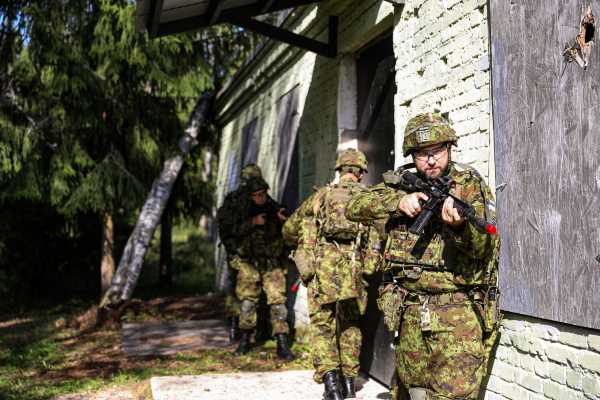
Estonian military exercise, August 2023: after the Russian invasion of Ukraine, states such as Moldova, Poland, and Estonia feared that they could be next. Photo Estonian Defence Forces
This article looks into the role norms, especially sovereignty, have in international relations in order to highlight their influence on war and peace. It does not cover the legal implications of the war in Ukraine. Instead, it examines the role of norms from an international relations perspective. The first section discusses the way conflicting norms interact and how the relative importance of norms can change over time. The second section draws a connection between Russian actions in 2022 and the way the significance of a norm can diminish. Since Putin is the decision-maker in Russia, an analysis of his statements is useful to understand Russian reasoning and justifications for violating the norm of sovereignty. By understanding Russian reasoning, and therefore how Putin tries to alter the relative importance of norms, an assessment is made on how the Russo-Ukrainian War can change the significance of the norm of state sovereignty. Acceptance of Russia’s interpretation of the permissibility of infringing state sovereignty makes future violations of the territorial integrity of other states substantially more acceptable.
Norms
State sovereignty is a fundamental norm in international relations.[7] Norms can be described as ‘standards of appropriate behaviour for actors with a given identity’.[8] However, the norm of state sovereignty is no absolute which is respected under all circumstances. For example, the US-led invasion of Iraq and the humanitarian intervention in Libya show that state sovereignty can be set aside. This does not mean that state sovereignty became obsolete, but that other norms were seen as vital enough to infringe upon the principle of state sovereignty. Bo Stråth underlines that political ideals, like sovereignty and human rights, are not absolute but rather ambiguous and contested.[9] Concepts and ideals like freedom, justice and self-determination can never be fully achieved. These ideals can even clash with each other. The ideal of autonomy may conflict with order, democracy with human rights, and stability with progress.[10] The relative importance of these political ideals is what matters. This relative importance is not a given but can change overtime.
One person who noticed the changing importance of the norm of state sovereignty was James Gow. As the twentieth century had come to an end, Gow argues that a revolution in international affairs had taken place.[11] He asserts that international peace and security took precedence over state sovereignty. While the norm of sovereignty remains significant, it does not define international society in the twenty-first century from an international politics point of view. State sovereignty can be infringed upon when international stability is at risk. To support his argument Gow highlights several profound changes in the international order. First of all, the principle of sovereignty lost its sanctity and became conditional on international accountability.[12] The importance of a viable and stable international order may provide a justification for the UN Security Council, or even for states, to intervene in the sovereignty of another state. As the world has become more interconnected and interdependent, the main goal of international society is to maintain the interwoven international order free from disruption, even if those disruptions originate from within states.[13] Since disruption of the international system is harmful to the states which depend on it, maintaining this international stability has become a justification for interference in a state’s sovereignty.
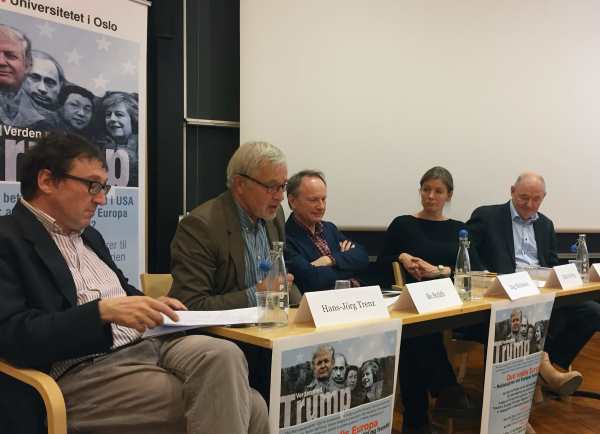
Bo Stråth (second from the left) underlines that political ideals, like sovereignty and human rights, are not absolute but rather ambiguous and contested. Photo Arena Centre for European Studies
Just three years after the publication of Gow’s A Revolution in International Affairs? his argument was strengthened by two subsequent US-led invasions. Although justified under the label of ‘self-defence’, the invasion of Afghanistan and subsequent toppling of the Taliban regime can be seen as an attempt to bring stability to a region which was harmful to the stability of the international system. The Taliban and its toleration of Al-Qaida caused instability in a lot of (Western) nations around the globe. Two decades of liberal nation-building followed on the assumption that a liberal democracy would be most beneficial for the long-term stability of the international system.[14] This shows that certain elements of state sovereignty can be set aside for longer periods of time for the sake of other norms, such as humanitarian development and stability of the international system.
The 2003 invasion of Iraq is even more supportive of Gow’s claim about the importance of the stability of the international system. Whether true or not, claims about Iraqi Weapons of Mass Destruction (WMDs) were justification enough for the US to violate Iraqi sovereignty. Since a leader like Saddam Hussein with WMDs could seriously disrupt the stability of the international system, an intervention (state-to-state invasion) would be permissible. Gow did not mean to argue that sovereignty lost its significance, only that other norms, such as international stability, could trump the principle of state sovereignty in international relations. Important to note is that these interventions did not aim to seize territory or redraw borders. In the last few decades territorial conquest seemed to be a thing of the past. Only the thwarted annexation of Kuwait by Iraq could be seen as an anomaly in an annexation-free era. The norm of state sovereignty constituted an almost sacred safeguard against territorial conquest.[15] The annexation of Crimea, therefore, took many by surprise.[16]
Which norms could justify the infringement of a state’s sovereignty change over time. In the first few years after the Cold War, Western military interventions were intended to end hostilities and establish a peace agreement with better guarantees for fundamental civil and human rights.[17] Over time, elements of sovereign power removal became gradually more acceptable and the deprived elements of sovereignty were placed under the responsibility of the international community. As the interference in state sovereignty became more acceptable, different goals such as regime change and nation-building emerged.[18] Justification for invasion was twofold. On the one hand, it was assumed that the people of Iraq and Afghanistan would prefer a Western-style liberal democracy;[19] on the other, regime change was needed in order to stop Iraq and Afghanistan from destabilizing the international system. Most beneficial for long-term stability of the system would be a liberal democratic state.[20] For example, in the short run, the intervention in Libya was intended to stop the violence.[21] However, even after the immediate threat had passed, Western states continued to support Libyan rebels. The extended rebel support can be attributed to the Western belief that a liberal and democratic Libya would eventually be a stabilizing contributor to the international system.[22] The notion that Western interventions are justified by the aim to construct liberal (and preferably democratic) states supports Gow's claim that international stability might be regarded as more important than state sovereignty.[23] If the transformation of troubling states into liberal states would be beneficial for the international stability, supporting such a transformation would be beneficial for liberal states themselves.
Some argue that a stable international order is a metaphor for a Western-dominated liberal world order. In this kind of criticism, even noble goals such as international stability and humanitarian causes are often used as a pretext to justify Western intervention driven by self-interest. One such critic is Putin. In his speech on the incorporation of several Ukrainian oblasts, Putin accused the so-called Western rule-based order of being hypocritical and without the approval of non-Western states.[24] Before looking into Russian criticism of international norms, it is necessary to consider mechanisms that may cause norms to lose their significance.
After World War II, establishing a norm against territorial conquest by force was part of a broader project to promote peace.[25] Since most pre-Cold War conflicts were fought for possession of land, a norm to prevent territorial conquest could take away a major source of conflict.[26] By enshrining the principle of sovereign equality of states and the norm against the use of force against the territorial integrity of states as cornerstones of the UN Charter, the norm against territorial conquest became codified into international relations itself.[27]
Various reasons can be found for states and their leaders to adhere to norms.[28] Some norms, such as those against genocide, follow from humanitarian reasons. However, respecting state sovereignty itself is not done out of humanitarian reasons. A norm can be respected because a state has no benefit in violating it. A norm might also be internalized to the point that violating it is no longer considered. Others follow norms out of fear of punishment for violation. But it is also possible to obey norms out of self-interest.[29] For many states adhering to the stability of the international system is in their own interest. States have an interest in upholding state sovereignty, particularly the taboo against territorial conquest, as it will make the international system far more stable. The assurance that they will not be divided up by more powerful states can be quite beneficial for smaller states.
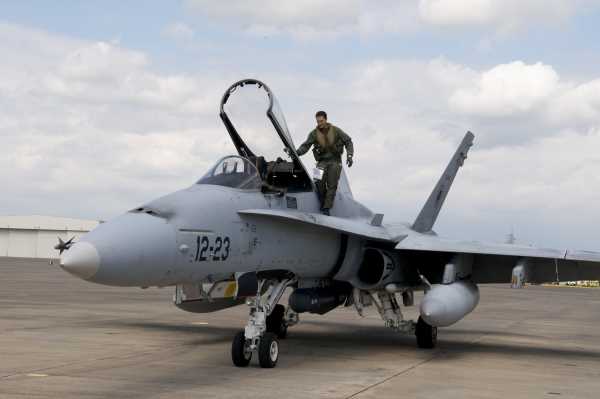
Spanish F-18 fighters refuel in Italy during Operation Odyssey Dawn to protect civilians from the Qadhafi regime in Libya: after the immediate threat had passed, Western states continued to support Libyan rebels. Photo US Air Force, Brendan Stephens
As noted, different norms may conflict and the relative importance given to norms may change. The conflicting character of norms is not necessarily negative. The UN Charter both encompasses the principle of self-determination of peoples and the principle of sovereign equality of states. Self-determination of peoples reinforces the sovereignty of states but when different peoples aim for self-determination, the principle of self-determination can also cause conflict within and around the borders of a state. The inherent conflicting character of norms can cause inconsistent normative pressures, especially since norms can never be fully achieved. A certain level of hypocrisy on which norm to prioritize enables states to take action either way, which allows these conflicts to be mitigated.[30]
The significance of norms can also decrease by the ‘salami slicing’ of existing norms.[31] Norms are nourished by enforcement.[32] But by just slightly overstepping the norm, it can be weakened step by step. The relatively weak response to the annexation of Crimea weakened the norm of state sovereignty. While the core of state sovereignty remained intact, it became questionable if the whole territory of a state fell under the norm of state sovereignty. The subsequent eight years of Russian involvement in the Donbas region also weakened the norm of state sovereignty. However, Western states contributed to the decline in the relative importance of the norm of state sovereignty as well. The widening of justifications for interventions could also be seen as salami-slicing the norm of state sovereignty.
The Russian perspective
Russia presents itself internationally as a norm-enforcer.[33] This includes efforts to emphasize the importance of respecting international law, the multipolar world and the United Nations.[34] In this Russian perspective, the UN Charter adequately provides globally applicable rules and norms, allowing a framework for peaceful cooperation among countries with various political systems.[35] In his June 2021 essay On Law, Rights and Rules, Russian Foreign Minister Lavrov stresses the importance of promoting the United Nations’ inclusive multilateralism. He is highly critical of the emergence of like-minded, typically Western, groups of countries that establish international rules. These groups ignore the United Nations, where other perspectives might be taken into account.[36] Lavrov concludes his essay by remarking that Russia persists in promoting a culture of international relations that is based on the supreme values of justice and is rooted in international law.[37]
In July 2021, Putin offered his interpretation of what state sovereignty entails. In his essay On the Historical Unity of Russians and Ukrainians, he concludes that Ukraine can only be truly sovereign in partnership with Russia. Putin comes to this conclusion by arguing that the current Ukrainian state is the consequence of some improvident administrative decisions made during the Soviet era. The collapse of the Soviet Union left Russia robbed and people found themselves taken away from their historical motherland.[38] Even worse, anti-Russian forces sought to artificially divide Russians and Ukrainians, as had been attempted numerous times in the past. Ukraine became a pawn in a geopolitical game where external Western control turned Ukraine into a springboard against Russia.[39] He wrote: ‘In the anti-Russia project, there is no place for a sovereign Ukraine’.[40] And: ‘I am confident that true sovereignty of Ukraine is possible only in partnership with Russia. Our spiritual, human and civilizational ties formed for centuries and have their origins in the same sources, they have been hardened by common trials, achievements and victories. Our kinship has been transmitted from generation to generation. It is in the hearts and the memory of people living in modern Russia and Ukraine, in the blood ties that unite millions of our families. Together we have always been and will be many times stronger and more successful. For we are one people.’[41]
In essence Putin argues that Ukraine and Russia, and even Ukrainians and Russians, are artificially separated. In his view, Ukraine is being controlled by anti-Russian elites; therefore, Ukraine is not truly sovereign. With this conclusion, Putin undermines the importance of internationally recognized state borders, and claims that state sovereignty is conditional on the people living there and on a government free from foreign control. Putin not only downplayed Ukraine’s sovereignty rhetorically but also put his words into action a mere six months later.
Just three days prior to the 2022 Russian invasion of Ukraine, Putin gave a speech justifying the use of force. Its foreign-controlled government no longer served the Ukrainian cause and consistently pushed Ukraine towards losing its sovereignty.[42] Ukraine had to be stopped acquiring nuclear weapons and Russia could not tolerate the genocide against four million people in the Donbas region. All Russian attempts were in vain; therefore Putin immediately recognized the independence and sovereignty of the Donetsk and Lugansk Peoples’ Republics.
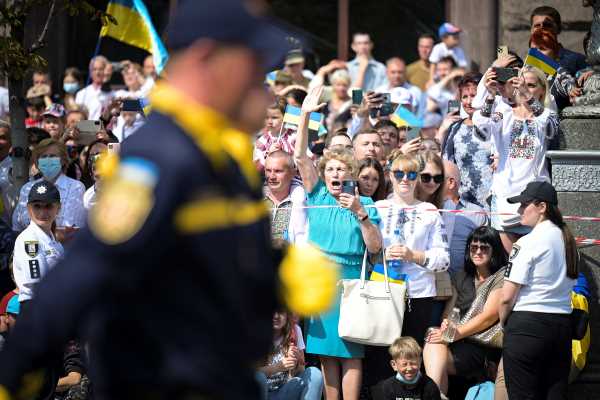
A Ukrainian woman cheers to a military unit marching by during the Independence Day parade at Kyiv, August 24, 2021: according to Putin, sovereignty of Ukraine is possible only in partnership with Russia. Photo US Air Force, Madeline Herzog
Recognizing break-away republics is not without precedent in relation to the norm of state sovereignty. But unilaterally incorporating territories into one’s own territory is in disparity with the prevailing norm regarding state sovereignty, especially if (parts of) these territories are under the control of another state.[43] In his September 2022 annexation speech, Putin accuses the West of forcing all states to hand over their sovereignty to the United States. Putin calls the rule-based order a Western construct to impose self-approved rules filled with double standards. It was the West that trampled upon the principle of the inviolability of borders and decides, on its own discretion, who has the right to self-determination and who does not.[44]
Putin’s words and actions that tie a state’s sovereignty and territorial integrity to historical perspectives and the ruling regime have the potential to undermine the importance of the principle of state sovereignty. State sovereignty, as codified in the UN Charter, entails the norm against territorial conquest by force. By annexing large parts of Ukrainian territory, Putin violates the longstanding norm against territorial conquest.[45] Since norms are nourished by enforcement, the current and future response to this violation is crucial for what the norm of state sovereignty will encompass in the future.[46]
Some Western scholars argue that giving in to certain Russian demands could end the conflict and as such benefit the stability of the international system. According to Robert Wade, a stable peace depends both on Western states and the Ukrainian government to accept a status where Ukraine avoids institutional hostility towards Russia. He claims that the Western notion of sovereignty is deeply hypocritical since the US would never allow the sovereign Mexican government to enter military alliances with Russia or China.[47] Although, giving in to the Russian demands to end the conflict in Ukraine could benefit the stability of the international system in the short run. On the other hand, giving in would result in a serious inflation of the norm of state sovereignty. Allowing that there might be circumstances that would permit violating a state’s sovereignty, even to annex territory, could destabilize the international system profoundly in the long run. Many regions in the world, from the Baltic Sea to East Asia and from the Caucasus to Central Africa, have long-standing and/or ethnic disputes which could justify similar territorial conquest attempts as seen in Ukraine. A weakened norm of state sovereignty could cause the (re)emergence of the possibility of territorial conquest in the international domain.
In his speeches Putin used several competing norms to justify the violation of Ukraine’s sovereignty. The equal rights and self-determination of peoples, the norm against the spread of WMDs, the humanitarian argument for stopping a genocide, and even Western hypocrisy were used to explain why Ukrainian territorial integrity could (and even should) be breached. Although this could be considered as mere rhetoric justifying the invasion, Putin did try to alter the relative value of the norms. While emphasizing the importance of sovereignty, he stated that other norms are important enough to violate Ukrainian sovereignty by force. The self-determination of a people is enough justification to incorporate the territory of another state into Russia. If this reasoning is accepted, the norm of state sovereignty would lose relative importance to other norms.
Conclusion
State sovereignty is, and will be, an important norm in international relations. But different norms may prevail over state sovereignty. The last three decades saw a growing tendency that the stability of the international system could predominate state sovereignty. Besides the relative importance of a norm, the significance of a norm could also diminish by repeated and/or large unsanctioned violations of the particular norm. Russia uses historic claims and the right of self-determination to justify severe violations of Ukraine’s sovereignty. By making sovereignty conditional on certain factors, Russia tries to make the norm of state sovereignty much less universal and important. While the United Nations is founded on the principle of equality of sovereign states, Putin argued that this is only the case when certain conditions are met. The attempt to annex Ukrainian territories by force could cause the norm of state sovereignty to lose a lot of its significance. If these violations are to be accepted by the international community, defying state sovereignty and annexing territories could become more acceptable as well. Historic claims and/or claims of people's self-determination can be made all over the world. Acceptance of Russian territorial claims could stabilize the international system in the short run. However, it is to be expected that giving in to Russian demands would destabilize the international system as a whole in the long run.
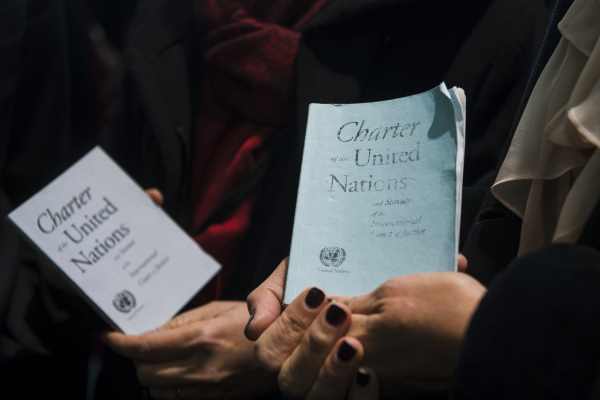
While the United Nations is founded on the principle of equality of sovereign states, Putin argued that this is only the case when certain conditions are met. Photo United Nations, Amanda Voisard
[1] Vladimir Putin, ‘Address concerning the situation in Ukraine’ (February 21, 2022) (translated).
[2] Tanisha M. Fazal, ‘The Return of Conquest?: Why the Future of Global order Hinges on Ukraine’, Foreign Affairs 101 (2022) (3) 23.
[3] David Sacks, ‘What is China learning from Russia’s war in Ukraine? America and Taiwan need to grasp and influence Chinese views on the conflict’, Foreign Affairs (2022) (online); John Ruwitch, ‘Taiwan fears what’s happening in Ukraine will happen there with China’, NPR, March 27, 2022.
[4] James Gow, ‘A Revolution in International Affairs?’, Security Dialogue 31 (2000) (3) 298; Fazal, ‘The Return of Conquest?’, 24.
[5] Gow, ‘A Revolution in International affairs?’, 296.
[6] Putin, ‘Address concerning the situation in Ukraine’ (February 21, 2022).
[7] Gow, ‘A Revolution in International affairs?’, 297.
[8] Fazal, ‘The Return of Conquest?’, 23.
[9] Bo Stråth, ‘Continuity Rather than Revolution. A Rejoinder’, Security Dialogue, 31 (2000) (4) 447.
[10] Ibid., 447.
[11] Gow, ‘A Revolution in International affairs?’.
[12] Gow, ‘A Revolution in International affairs?’, 296.
[13] Ibid., 296.
[14] In line with the reasoning as written down in: Michael Howard, The Invention of Peace and the Reinvention of War (London, Profile Books, 2002) 105. The first edition stems from 2000.
[15] Fazal, ‘The Return of Conquest?’, 20.
[16] Although, there was no use of brute force in the annexation of Crimea.
[17] Jan Willem Honig, ‘The Wars Militaries Fight for Democracy’, in: H. Gärtner, J.W. Honig and H. Akbulut (eds.), Democracy, Peace and Security (London, Lexington Books, 2015) 146.
[18] Honig, ‘The Wars Militaries Fight for Democracy’, 146.
[19] Ibid., 147.
[20] Howard, The Invention of Peace, 105.
[21] Honig, ‘The Wars Militaries Fight for Democracy’, 147.
[22] Christopher Kutz, On War and Democracy, (Princeton, Princeton University Press, 2016) 166.
[23] Honig, ‘The Wars Militaries Fight for Democracy’, 147.
[24] Vladimir V. Putin, ‘Speech on the Incorporation of Donetsk, Lugansk, Kherson and Zaporozhye’ (September 30, 2022) (translated).
[25] Fazal, ‘The Return of Conquest?’, 23.
[26] Ibid., 23.
[27] Ibid., 23.
[28] Ibid., 24.
[29] Ibid., 24.
[30] Robert Egnell, ‘The organized hypocrisy of international state-building’, Conflict, Security & Development, 10 (2010) (4) 470.
[31] Stacie Goddard, ‘The Outsiders: How the International System can still check China and Russia’, Foreign Affairs, 101 (2022) (3) 35.
[32] Fazal, ‘The Return of Conquest?’, 25.
[33] Richard Sakwa, ‘Russia’s Identity: Between the ‘Domestic’ and the ‘International’’, Europe-Asia Studies 62 (2011) (6) 970.
[34] Ibid., 969.
[35] Richard Sakwa, ‘Crisis of the International System and International Politics’, Russia in Global Affairs, 21 (2023) (1).
[36] Sergei V. Lavrov, ‘On Law, Rights and Rule’, Russia in Global Affairs, 19 (2021) (3) 234.
[37] Ibid., 240.
[38] Vladimir V. Putin, ‘On the Historical Unity of Russians and Ukrainians’, TheKremlin.ru (2021) (translated).
[39] Ibid., 13.
[40] Ibid., 17.
[41] Ibid.
[42] Putin, ‘Address concerning the situation in Ukraine’, (February 21, 2022).
[43] Eiki Berg and Shpend Kursani, ‘Back to the Future: Attempts to Buy, Swap, and Annex Territories in Contemporary Sovereignty Practices’, Global Studies Quarterly (2023) (3) 4.
[44] Putin, ‘Speech on the Incorporation of Donetsk, Lugansk, Kherson and Zaporozhye’.
[45] Berg and Kursani, ‘Back to the Future’, 4.
[46] Fazal, ‘The Return of Conquest?’, 5; Since the US has already completed its march West and fully incorporated Native American lands into its own territory, the critique that the norm against territorial conquest is hypocritical and also generally advantageous for the US-led world order is difficult to refute. However, the norm of state sovereignty and the related territorial integrity eliminated a major cause of war, greatly contributing to the stability of the international system: Fazal, ‘The Return of Conquest?’, 22.
[47] Robert Hunter Wade, ‘A ‘diplomatic solution’ to the war in Ukraine’, USApp – American Politics and Policy Blog (March 2022).
